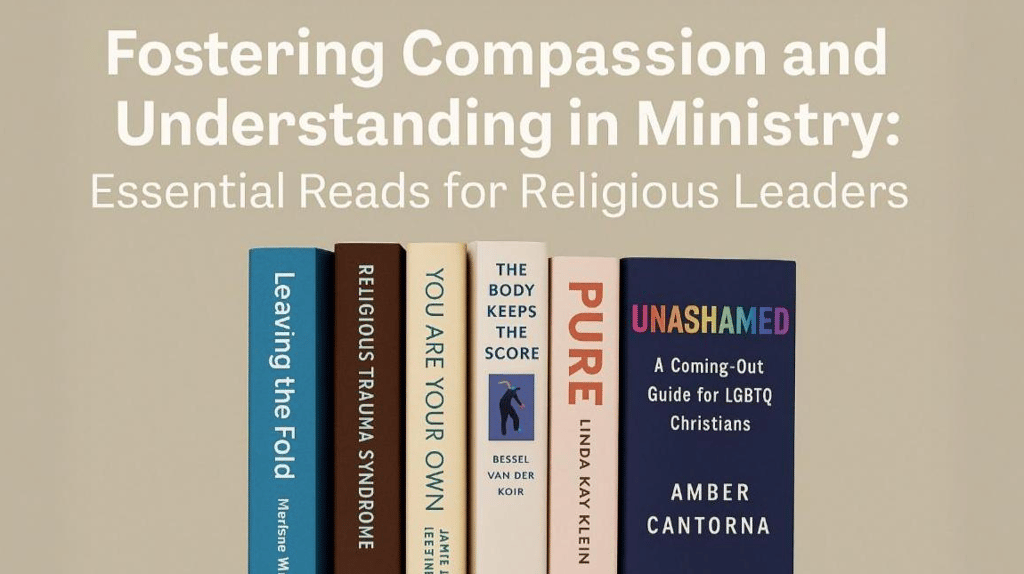Fostering Compassion and Understanding in Ministry
Essential Reads for Religious Leaders
BY LEAD WRITER AT GRIEFBLOOMS.COM
4/23/20252 min read


In the journey to serve their congregations more effectively, religious leaders must understand the varied and deeply personal experiences of their members. Recognizing the potential for religious trauma and the need for a compassionate response is crucial.
This article outlines a selection of books that provide insight into the impacts of religious trauma, offering guidance on how leaders can foster a more inclusive and supportive community.
The Importance of Informed Leadership
Religious leaders play a pivotal role in shaping the spiritual environments of their communities. By deepening their understanding of how religious practices can inadvertently harm, they can transform their ministries into spaces where all individuals feel truly seen and valued, just as they are seen in God’s eyes.
Recommended Reading List
"Leaving the Fold" by Marlene Winell
Overview: A comprehensive guide for those questioning their faith and for leaders to understand the emotional and psychological impact of strict religious doctrines.
Why It’s Important: Helps leaders grasp the challenges faced by individuals leaving fundamentalist communities, fostering empathy and support in their pastoral care.
"Religious Trauma Syndrome" by Bonnie Zieman
Overview: Unpacks the concept of Religious Trauma Syndrome and its prevalence in organized religions.
Why It’s Important: Encourages leaders to identify symptoms of RTS among their members and adjust their pastoral approaches to avoid exacerbating these conditions.
"You Are Your Own" by Jamie Lee Finch
Overview: Discusses the personal journey of reclaiming one's life from the impacts of evangelical Christianity.
Why It’s Important: Provides insights into the personal narratives of individuals who feel damaged by religious expectations, aiding leaders in fostering a more accepting community.
"The Body Keeps the Score" by Bessel van der Kolk
Overview: Explores the effect of trauma on the body and mind and methods for healing.
Why It’s Important: While broader in scope, this book equips religious leaders with the understanding necessary to support trauma-informed approaches in ministry.
"Pure" by Linda Kay Klein
Overview: Details the experiences of young women in the evangelical purity movement.
Why It’s Important: Challenges leaders to consider the deep-seated impacts of purity culture and to advocate for a more grace-filled approach.
"Unashamed" by Amber Cantorna
Overview: Offers perspectives and support for LGBTQ+ Christians navigating their faith.
Why It’s Important: Aids leaders in understanding the unique challenges faced by LGBTQ+ members, promoting inclusivity and acceptance within their ministries.
Implementing What You Learn
Engage with the Material: Schedule regular reading times and reflect on how each book’s themes apply to your ministry.
Discuss and Share Insights: Organize book clubs or discussion groups within your leadership team to discuss key takeaways and practical applications.
Act on the Knowledge: Integrate insights from these readings into your sermons, counseling, and community interactions to ensure all members feel valued and understood.
Conclusion
Embracing these resources can significantly enhance the effectiveness of your ministry in dealing with complex and sensitive issues. As leaders, it’s our responsibility to ensure that our ministries reflect God’s unconditional love and understanding, helping every member of our flock feel truly welcomed and seen.
Call to Action
We encourage all religious leaders to consider these books as tools for personal and communal growth. Start with one book, gather insights, and gradually implement new practices in your ministry. Together, we can build more compassionate and understanding communities in faith.
Empowerment
Reclaiming faith for all.
Connect
© 2024. All rights reserved.
Content Disclaimer: All content shared on Pride Faith Voices belongs to the individual writers and reflects their personal views and experiences. These opinions and perspectives do not necessarily represent the official stance of Pride Faith Voices as a whole.
